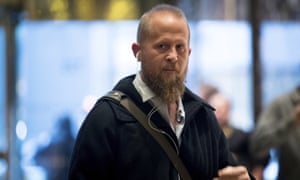Trump digital director says Facebook helped win the White House
Brad Parscale tells CBS’ 60 Minutes, ‘Twitter is how [Trump] talked to the people’ but says the other social media giant was key for targeted advertising Brad Parscale, Trump’s digital director, did not offer any data to back up his claims that micro-targeted Facebook ads were decisive in Trump’s victory. Photograph: Andrew Harnik/AP
Brad Parscale, Trump’s digital director, did not offer any data to back up his claims that micro-targeted Facebook ads were decisive in Trump’s victory. Photograph: Andrew Harnik/AP
The Trump presidential campaign spent most of its digital advertising budget on Facebook, testing more than 50,000 ad variations each day in an attempt to micro-target voters, Trump’s digital director Brad Parscale told CBS’ 60 Minutes in an interview scheduled to air on Sunday night.
“Twitter is how [Trump] talked to the people, Facebook was going to be how he won,” Parscale said.
Facebook provided Trump 2016 with employees who embedded in the campaign’s digital office and helped educate staffers on how to use Facebook ads, he said. Because he “wanted people who supported Donald Trump”, he said, the Facebook employees were questioned on their political views.
The campaign then used Facebook to reach clusters of rural voters, Parscale said, such as “15 people in the Florida Panhandle that I would never buy a TV commercial for”.
“I started making ads that showed the bridge crumbling,” he said. “I can find the 1,500 people in one town that care about infrastructure. Now, that might be a voter that normally votes Democrat.”
Parscale said the campaign constantly tested minute variations in the design, color, background and phrasing of Facebook ads, in order to maximize their impact. Typically 50,000 to 60,000 variations were tested each day, he said, and sometimes as many as 100,000.
In the realm of digital campaign advertising, micro-targeting of voters and constant testing of the effect of minute differences in ads are not new or innovative actions.
But Parscale’s comments highlight how actively Facebook has pursued election advertising as a business strategy, even as its platform has come under attack as a fertile ground for Russian-backed political propaganda, conspiracy theories and other forms of disinformation.
Among other services, Facebook’s elections advertising allows campaigns to take lists of registered voters drawn from public records and find those people on Facebook.
Parscale said he asked the Facebook “embeds” to teach staffers everything the Clinton campaign would be told about Facebook advertising “and then some”.
On Sunday, a Facebook spokesman said the support the company offered the Trump campaign was standard practice, both for Facebook and across other industries.
“For candidates across the political spectrum, Facebook offers the same levels of support in key moments to help campaigns understand how best to use the platform,” spokesman Andy Stone wrote in an e-mail.
Parscale said he was told the Clinton campaign did not use Facebook employee embeds. “I had heard that they did not accept any of [Facebook’s] offers,” he told CBS.
According to Facebook, it afforded the Clinton campaign the same level of support as the Trump campaign.
Stone, the Facebook spokesman, wrote: “While Facebook teams offer insight into how our products work, campaigns make their own strategic decisions about how to use the Facebook platform.”
Before the 2016 election, Bloomberg reported that some Trump campaign ads were designed to dishearten potential Clinton supporters, including women and African Americans, actions that in the words of a senior Trump campaign official constituted “major voter suppression operations”.
One Facebook ad the Trump campaign aimed at some African American voters, Bloomberg reported, was an animation of Clinton talking about “juvenile super predators” in 1996, with the caption: “Hillary Thinks African Americans are Super Predators.”
Transparency regulations for Facebook ads are being debated in Washington. Facebook succeeded in having its ads classified as small campaign items, like buttons, that did not require an official disclosure to the Federal Elections Commission (FEC) like other campaign advertising. That decision has come under attack. The FEC is reviewing it.
Parscale told CBS he believed liberal tech company innovators were surprised and shocked by how their platforms had been used to “push conservative values”.
“These social platforms are all invented by very liberal people on the west and east coast,” he said. “And we figure out how to use it to push conservative values. I don’t think they thought that would ever happen.”
It is not clear why tech companies would be shocked that products they aggressively marketed to conservative and liberal campaigns would be used to elect Republicans.
Excerpts of the interview did not make clear if Parscale offered any data to back up his suggestion that Facebook ads targeting 15 people at a time were “how Trump won”.
Digital advertising experts have cautioned for years that when talking to the media, campaign strategists often over-hype the sophistication of “micro-targeting” and similar digital efforts.
Geen opmerkingen:
Een reactie posten
Opmerking: Alleen leden van deze blog kunnen een reactie posten.